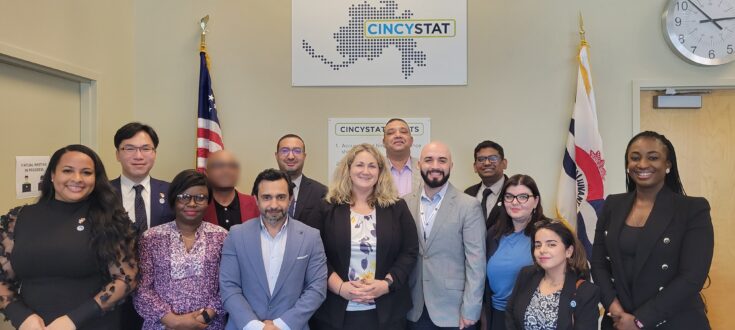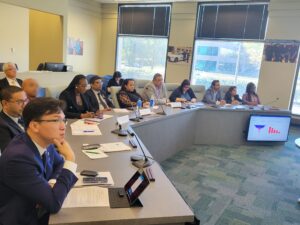Cincinnati: A Transparent City Part 1

As we enter the spooky season, our international visitors arrived in Cincinnati to study something equally as spooky: government corruption.
During the week of September 30th through October 4th, the World Affairs Council welcomed eleven delegates from the African Union, Albania, Egypt, Eritrea, Saudi Arabia, Sri Lanka, Taiwan, Trinidad and Tobago, Tunisia, and Zimbabwe. The main purpose of their visit was to enhance their understanding of underlying principles of ethical systems, examine the roles of citizens and civil society in fostering transparency and accountability in government, and highlighting the mechanisms which enable citizens to foster good governance.
As many people know, Cincinnati has struggled with ethical standard and good governance in the past. As recently as October 10th, 2023, former Cincinnati Council Member Alexander “P.G.” Sittenfeld was sentenced in U.S. District Court to 16 months in prison for bribery and attempted extortion by a government official. He was one of three former City Council Members who had been indicted in 2020.
So why would we possibly want to bring our visitors here to talk about something so shady? You might be asking yourself: ‘Why wouldn’t we want to show them the good things we do? Can’t we just gloss over the bad?’
I know. We don’t like talking about our failures. Unfortunately, we aren’t perfect. By talking to our delegates about this, and revealing that these things do happen here, we can work together to move to a better future.
In this case study, Cincinnati has a lot to be proud of. Through its failures, Cincinnati has created many structures to hold our local government accountable so that this does not happen again.
Check out a few of the resources we met with!
City Council Members
On Monday, October 2nd, 2023, the delegates joined Cincinnati community members at the Courthouse to observe the Budget and Finance Committee Meeting. The delegates were able to view the city budget proceedings. They were interested in how this open viewing allows the community to participate in the process and communicate concerns publicly to the city Council Members.

Delegates with the Cincinnati Council Members
Although this Committee meeting ran short, President Pro Tem Victoria Parks, and Council Members Jeff Cramerding, Reggie Harris, Mark Jeffreys, Scotty Johnson, Liz Keating, Meeka Owens, and Seth Walsh warmly welcomed the delegates. They took time out of their busy schedules to speak with the delegates. They were very interested to learn about their work and the purpose of their visit.
While this was not an official meeting, it was such a moment of connection for the City of Cincinnati government with their international colleagues. Building these connections is an important part of our local global community.
Office of Performance and Data Analytics
The Office of Performance and Data Analytics is an office of the Cincinnati City Government which pulls in data from other systems across the city—such as from the police, 911, etc.—and cleans it up, transforming it into interactive dashboards for city leadership. Many of these dashboards are also available for the public so that community members can do their own analysis. This data is available on CincyInsights, an interactive dashboard portal to make city data visual, conveniently accessible, and user-friendly for all members of the Cincinnati community.
Any issues that community members find can be brought to the City Council Members during the Budget and Finance Committee meetings. By doing so, the Office of Performance and Data Analytics can create transparency and equity throughout the city.

Delegates at meeting with the Office of Performance and Data Analytics
Delegates were very interested in how the data was collected and how issues of privacy were addressed.
Kelly LaFrankie, Innovation Manager, and Abdul Rahman Alloush, Innovation Specialist, explained that the data was collected through other systems that already existed, such as CAD, the Police’s data set, and imported. Other ways that data is collected are through neighborhood summits and the Annual Community Perceptions Survey. Through these efforts, the Office of Performance and Data Analytics can present to the City Manager how the community would like to prioritize how time and money is spent.
The delegates were very enthusiastic to learn how to build these types of datasets in their own countries.
What’s Next?
Transparency is incredibly important to create community trust. While Cincinnati has had its troubles in the past, the city is open to learning from its’ mistakes through these new and somewhat innovative techniques.
In Part 2, we will continue to delve into the resources Cincinnati has to create transparency and accountability with the community. We will discuss the Office of Ethics and Good Government and the Urban League of Southwestern Ohio’s Community Partnering Center.


